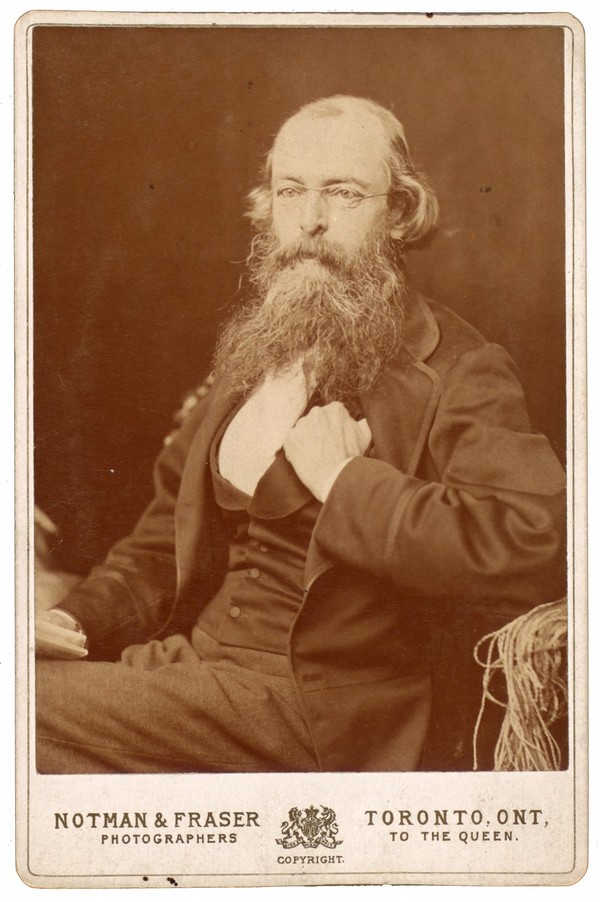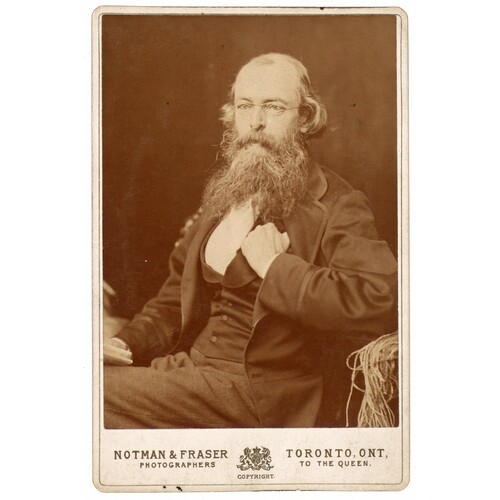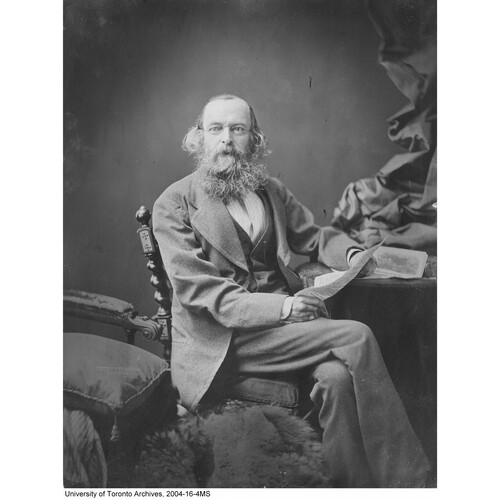
Source: Link
CROFT, HENRY HOLMES, professor of chemistry and author; b. 6 March 1820 in London, England, youngest son of William Croft; m. in 1844 Mary Shaw, and they had seven children; d. 1 March 1883 at Las Hermanitas, near San Diego, Tex.
Henry Holmes Croft, after attending London schools, became a clerk in the Ordnance Office (his father was deputy paymaster general of ordnance) and attended University College, London, as an occasional student. There he developed an intense interest in experimental chemistry, which he pursued in a home-built laboratory in the family residence. Observing this preoccupation, his father sought advice from a friend, Michael Faraday, who advised that the youth should be sent to Germany to further his studies. Accordingly, in 1838 Croft entered the University of Berlin, where he studied for some three and a half years under several eminent professors, particularly the noted Eilhard Mitscherlich. In addition to his studies in chemistry, he acquired a broad scientific training in such subjects as mineralogy and geology, botany and zoology, physics, and entomology; the last became one of his special interests. He did not take a phd, although he was awarded an honorary dcl at the University of Toronto in 1853.
In 1842 the cornerstone of King’s College was laid at Toronto and it became the responsibility of the governor general, Sir Charles Bagot*, as chancellor, to select the first members of the teaching staff. After consultation with leading English scientists he offered Croft the chair of chemistry and experimental philosophy. At the end of 1842, at the age of 22, Croft left for Canada and took up his new duties in Toronto in the following year.
Despite his youth, Croft immediately entered briskly into the controversies swirling about King’s College concerning its control by the Church of England. In his first year he opposed the president of the college, Bishop John Strachan*, and in association with the professor of anatomy and physiology, Dr William Charles Gwynne*, petitioned the provincial legislature for amendments to weaken church control. Gwynne and Croft were a minority on the college council at first, but by the end of the decade they had won over most members. When the University of Toronto replaced King’s College in 1850, Croft became vice-chancellor (until 1853), and after 1857 he was a member of the university senate.
Croft was an effective teacher who encouraged his students in experimental approaches; his broad scientific training stood him in good stead at a time when a small teaching staff put a premium on versatility. He continued research of his own, particularly on the double salts of cadmium, but was not much interested in publishing his results. He was, however, a founder, and a president, of the Canadian (later Royal Canadian) Institute, and several of his papers were published in its journal. When the School of Practical Science was established at Toronto in 1877 he was appointed professor of chemistry and chairman of the board. He also supported the establishment of what became the Ontario Agricultural College at Guelph [see William Johnston].
Croft took a keen interest in various phases of community life. He was an accomplished pianist, and a member of the Quintette Club and of the Philharmonic Society. He was active in various societies, especially those related to agriculture, horticulture, and entomology, as well as the mechanics’ institute. But his most enthusiastic extracurricular interest was aroused following the Trent affair of 1861 [see Charles Hastings Doyle] when the threat of war with the United States led to the formation of corps of volunteer militia in the Province of Canada. A university rifle corps was raised, which became the 9th Company, Queen’s Own Rifles, and Croft was elected its captain. He continued in the company for several years, attaining the rank of major before retiring.
Croft acquired a considerable reputation in the field of toxicology. He became skilled in detecting the presence of poisons and was frequently consulted in cases where homicide was suspected.
His long-time colleague, Daniel Wilson*, who was not noted for his charitable judgements, described Croft as “most genuinely transparent, honest, and straightforward,” one who “instinctively hat[ed] shams.” Croft’s last years were darkened by several family tragedies and in 1880 he retired on two-thirds salary to live on his son’s farm in Texas, where he died not long afterward.
Henry Holmes Croft was the author of Course of practical chemistry, as adopted at University College, Toronto (Toronto, 1860). A list of his other works appears in Morgan, Bibliotheca Canadensis, 85–86.
UTA, Daniel Wilson, Journal. Examiner (Toronto), 20 Dec. 1843. John King, McCaul, Croft, Forneri: personalities of early university days (Toronto, 1914). University College: a portrait, 1853–1953, ed. C. T. Bissell (Toronto, 1953). Wallace, Hist. of Univ. of Toronto. C. R. Young, Early engineering education at Toronto, 1851–1919 (Toronto, 1958). W. H. Ellis, “Henry Holmes Croft, D.C.L.,” Univ. of Toronto Monthly (Toronto), 2 (1901–2): 29–32.
Cite This Article
G. M. Craig, “CROFT, HENRY HOLMES,” in Dictionary of Canadian Biography, vol. 11, University of Toronto/Université Laval, 2003–, accessed December 21, 2025, https://www.biographi.ca/en/bio/croft_henry_holmes_11E.html.
The citation above shows the format for footnotes and endnotes according to the Chicago manual of style (16th edition). Information to be used in other citation formats:
| Permalink: | https://www.biographi.ca/en/bio/croft_henry_holmes_11E.html |
| Author of Article: | G. M. Craig |
| Title of Article: | CROFT, HENRY HOLMES |
| Publication Name: | Dictionary of Canadian Biography, vol. 11 |
| Publisher: | University of Toronto/Université Laval |
| Year of publication: | 1982 |
| Year of revision: | 1982 |
| Access Date: | December 21, 2025 |




